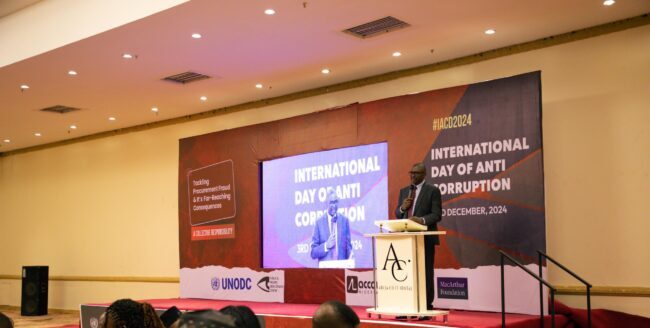Civil society organisations (CSOs) in Nigeria took a bold step in combating corruption as they marked the 2024 International Anti-Corruption Day with a pivotal town hall meeting in Abuja.
Organised by Accountability Lab Nigeria in partnership with the Public and Private Development Centre (PPDC), the United Nations Office on Drugs and Crime (UNODC), and backed by the MacArthur Foundation, the event addressed systemic corruption in Nigeria’s public procurement processes, a critical driver of financial inefficiencies and fraud.
Under the theme, “Tackling Procurement Fraud and Its Far-Reaching Consequences: A Collective Responsibility,” the event gathered key stakeholders, including government officials, private sector representatives, civil society leaders, and international development partners. The discussions centred on eliminating fraud within public procurement systems, which remain riddled with secrecy, inefficiency, and abuse.
One of the highlights of the event was a sobering statistic shared by the PPDC: over 56% of Freedom of Information (FOI) requests for procurement details go unanswered. This lack of transparency has fostered an environment where public resources are mismanaged and citizens are kept in the dark about the use of taxpayers’ money. Despite frameworks like the Public Procurement Act and initiatives such as the World Bank State Fiscal Transparency, Accountability, and Sustainability (SFTAS) program, loopholes in the system persist, hindering fair competition and the efficient delivery of public services.
Panel discussions focused on integrating innovative solutions to bridge these gaps, with a spotlight on Al-driven open contracting and gender-responsive procurement practices. States like Ekiti, Edo, and Plateau were showcased for their transparency efforts, while Kaduna was lauded for pioneering gender-responsive procurement initiatives. These examples highlighted the potential of technology and inclusive policies in reshaping procurement processes.
In an interactive session, participants examined recommendations from the United Nations Convention Against Corruption (UNCAC), offering fresh insights into addressing the disconnect between policy frameworks and real-world practices. Concrete solutions, such as expanding the use of artificial intelligence and promoting gender equity, emerged as key strategies for transforming procurement practices.
The dialogue underscored the collective responsibility of stakeholders in fostering accountability. Participants emphasised the importance of closing gaps in oversight mechanisms and supporting ethical business conduct to reduce procurement fraud’s impact on national development.
The town hall also encouraged collaborative problem-solving, allowing stakeholders to co-create sustainable reforms. This participatory approach marked a shift from merely identifying problems to implementing actionable solutions that promote long-term integrity and fairness in public procurement.
Beyond discussions, the event achieved tangible outcomes. Commitments were made to prioritise responsible business conduct, enhance open contracting mechanisms, and implement unaddressed UNCAC recommendations. These pledges signify a collective resolve to advance procurement reforms and improve the governance of public funds.
As Nigeria battles corruption, events like this town hall are vital in galvanising momentum for transparency and accountability. By leveraging technology, fostering inclusivity, and encouraging collaboration, stakeholders are charting a path toward a more transparent and efficient public procurement system that benefits all citizens.
Speaking to journalists on the sidelines of the event, the Executive Director of Accountability Lab, Odeh Friday, emphasised the need to foster a culture of integrity and accountability in public service procurement. He stressed that corruption must be eradicated to ensure due process and transparency in governance. Mr. Friday acknowledged the collaborative efforts of like-minded organisations and government agencies in combating corruption. He further urged government agencies to take the fight against corruption seriously and commit to its total eradication in public service operations.
READ MORE FROM: NIGERIAN TRIBUNE
Get real-time news updates from Tribune Online! Follow us on WhatsApp for breaking news, exclusive stories and interviews, and much more.
Join our WhatsApp Channel now
